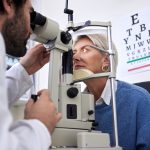How your eyes can predict heart attack risk
 (NaturalHealth365) The tiny blood vessels in your eyes are telling a story about your health that most doctors never bother to read. New research from McMaster University, published in Science Advances, reveals something remarkable: those delicate vessels can predict your heart disease risk and show whether you’re aging faster than you should.
(NaturalHealth365) The tiny blood vessels in your eyes are telling a story about your health that most doctors never bother to read. New research from McMaster University, published in Science Advances, reveals something remarkable: those delicate vessels can predict your heart disease risk and show whether you’re aging faster than you should.
“The eye provides a unique, noninvasive view into the body’s circulatory system,” says Dr. Marie Pigeyre, the study’s senior author. “Changes in the retinal blood vessels often mirror changes occurring throughout the body’s small vessels.”
What researchers found in 74,000 people’s eyes
The research team analyzed retinal scans, genetic data, and blood samples from over 74,000 participants. What they discovered was striking: people whose retinal blood vessels had simpler, less-branched patterns faced higher cardiovascular disease risk and showed unmistakable signs of accelerated biological aging – higher inflammation and shorter lifespans.
Your eye doctor might be looking at clues to your longevity during a routine exam and not even realize it.
The scientists identified two inflammatory proteins fueling this vascular damage: MMP12 and IgG-Fc receptor IIb.
Why blood vessels age faster than you may think
Chronic inflammation builds from years of dietary choices, environmental exposures, and nutritional gaps. Those tiny retinal vessels are metabolically active and vulnerable to what’s happening throughout your vascular system.
High blood sugar triggers a process called glycation, in which proteins become sticky and damaged. Over time, this stiffens blood vessels throughout your body, including those in your eyes. The simpler vessel patterns researchers spotted likely reflect years of accumulated glycation damage.
Heavy metals, environmental chemicals, and metabolic waste create a toxic burden that inflames and damages your smallest blood vessels first. Meanwhile, if you’re deficient in key nutrients (like vitamin C), your body can’t keep up with repairs.
Bottom line: The damage outpaces your ability to fix it.
Protecting your eyes protects your entire vascular system
What makes this research so powerful? Those retinal blood vessel changes are an early warning sign. By the time simpler, less-branched patterns show up in your eyes, systemic vascular damage is already underway throughout your body. But here’s the good news: the same strategies that protect your retinal vessels protect every blood vessel in your body.
Start with what feeds your eyes. Your retina has the highest metabolic rate of any tissue in your body. It needs constant nutrient delivery through healthy blood vessels.
Wild-caught fish rich in omega-3s directly reduce the inflammatory proteins (MMP12 and IgG-Fc receptor IIb), this study identified. Organic berries packed with anthocyanins strengthen capillary walls in your eyes and everywhere else. Dark leafy greens provide lutein and zeaxanthin that concentrate in retinal tissue.
Extra virgin olive oil delivers polyphenols that protect delicate vascular structures.
Control blood sugar to protect retinal vessels. High blood sugar damages the tiny vessels in your eyes first because they’re so metabolically active. Every blood sugar spike causes glycation damage – those simpler vessel patterns researchers found likely reflect years of this. Skip refined carbs, eat protein with meals, consider berberine or chromium.
Key nutrients for eye vessel health. Vitamin C and lysine build strong capillary walls – critical for those retinal vessels. Magnesium relaxes blood vessels and reduces inflammation throughout your vascular system, including your eyes. Vitamin K2 prevents vascular calcification. CoQ10 protects the energy-producing mitochondria packed densely in retinal cells.
Antioxidants are non-negotiable for eye health. Your retinal vessels face constant oxidative stress from light exposure and high metabolic activity. Glutathione (or NAC), vitamin E, selenium, astaxanthin, and lutein directly protect retinal tissue.
Reduce toxic burden affecting eye vessels. Filter your water – fluoride and heavy metals damage delicate eye vessels. Choose organic to avoid pesticides that cross into eye tissue. Support liver detoxification with organic cruciferous vegetables and milk thistle.
Simply put, less systemic toxicity means healthier retinal blood vessels.
Exercise improves retinal blood flow. Movement increases circulation to your eyes, improves insulin sensitivity (protecting those glucose-sensitive retinal vessels), and reduces systemic inflammation.
Listen to what your eyes are telling you
This research proves something important: your vascular system starts declining years before heart disease, stroke, or dementia announce themselves. Your eyes are broadcasting early warnings.
The conventional approach would be to wait for pharmaceutical interventions targeting those inflammatory proteins. But why wait when the root causes – poor diet, blood sugar chaos, toxic accumulation, nutrient depletion – are sitting right in front of you, completely addressable today?
If you want comprehensive strategies for protecting your vision, supporting vascular health, and preventing age-related eye problems, get access to Jonathan Landsman’s Eye Health Docu-Class, which brings together many of the best holistic ophthalmologists and optometrists revealing how inflammation damages retinal blood vessels; which nutritional strategies actually protect eye health; how vascular and vision health connect; what advanced testing can detect problems early; and natural protocols for preserving vision as you age.
Sources for this article include:



